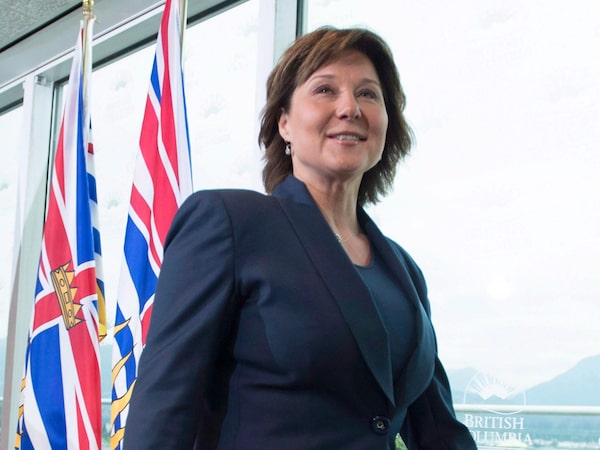
Then-British Columbia Premier Christy Clark leaves a news conference at her office in Vancouver on May 10, 2017.JONATHAN HAYWARD/The Canadian Press
Former BC Liberal premier Christy Clark is calling on her party to broaden its appeal to voters by assertively talking about issues beyond the provincial party’s traditional focus on the economy.
As the Liberals talk about renewal after a devastating election result in which the NDP won a majority government, the province’s premier between 2011 and 2017 said her party needs a more wide-ranging conversation with British Columbians.
Ms. Clark said that while the economy is key, "I think the public has an expectation that we’re going to talk about some other issues as well.”
To be specific, she cited climate change, addressing the wage gap for women, systemic discrimination, supporting First Nations and the LGBTQ community.
“We need to find a way through what used to be called those conscience issues," she said. "I think that’s going to be tricky. With the right leader, we can find a way through those things.”
Based on final counts disclosed Sunday, the BC Liberals lost 13 seats, ending up with 28 seats in the 87-seat legislature. The NDP won 57. The BC Greens won two.
Ms. Clark said she was on the sidelines in the Oct. 24 election, helping out where asked. It was a low-profile role at odds with a run in politics that began when she was first elected as an MLA in 1996. She held cabinet posts as education minister and minister of children and family development before leaving politics, then returned to lead the party and become premier in 2011.
She guided the Liberals to re-election in 2013, securing a majority government, but stepped down in 2017 after the Liberals won the most seats, but not enough to fend off a move by the NDP to form a majority government with support from the BC Greens.
Andrew Wilkinson took over from her as party leader. After the Liberals' sound defeat in last month’s election, he has announced he will step down once a new leader is chosen.
Mr. Wilkinson was criticized by some of his own MLAs for failing to strongly respond during the campaign to two Liberal candidates who created controversy. One of them made belittling and sexist comments in a virtual sendoff for a retiring colleague. The second was fired as a Liberal candidate after he made comments equating free birth control with eugenics.
Ms. Clark declined comment, but called on the new leader to head off such questions about the Liberals' commitment to social justice.
“From the get-go, our new leader needs to be clear about that stuff, that we are Liberals, we believe in equality. We want to fight racism. We want to fight bigotry. We’ve always stood for that. That’s a challenge for the new leader to get out ahead of that at the very beginning.”
Mr. Wilkinson has been criticized for failing to connect with voters. In a recent interview, Vancouver developer Bob Rennie, a former key fundraiser for the BC Liberals under Ms. Clark, said he declined to have anything to do with the Liberals under Mr. Wilkinson.
“I sat out this one,” he said of the recent election. He said he expected the party would suffer a major defeat. “You could see that happening. I told Andrew in a conversation, before he ran, that no party is going to be elected unless it becomes youthful, and starts to look toward tomorrow. Andrew may have been surrounded by people who wanted yesterday back.”
Ms. Clark was more sympathetic to Mr. Wilkinson. As premier, she appointed him, over time, to three cabinet posts. “I don’t put this election loss down to any personal shortcoming on the leader’s part in Andrew’s case. I think this was an unwinnable election. I think the NDP set it up that way.”
She added Mr. Wilkinson was in “an almost impossible situation,” trying to gain traction during an election that inevitably had low voter turnout because of the pandemic.
Ms. Clark, 55, said she hopes the next party leader comes as a result of a race that includes younger candidates – “by that I mean 45 and younger," she said – as well as women and people of colour.
“I hope it’s a really diverse race. The BC Liberals had a good long run on a really strong economic agenda, but I think people want to hear about other things now from us as well. It needs to be someone who brings those ideas to the table,” she said.
Ms. Clark, now a senior adviser at the Bennett Jones law firm in its Vancouver office and a member of several corporate boards, said she has no interest in returning to elected politics.
Also, she advised the party not to get caught up in a debate about changing its name – a step some have cited as necessary given the BC Liberals are a coalition of federal Liberals and federal Conservatives. “I am agnostic about it; I don’t think anybody should believe that’s a panacea.”
We have a weekly Western Canada newsletter written by our B.C. and Alberta bureau chiefs, providing a comprehensive package of the news you need to know about the region and its place in the issues facing Canada. Sign up today.